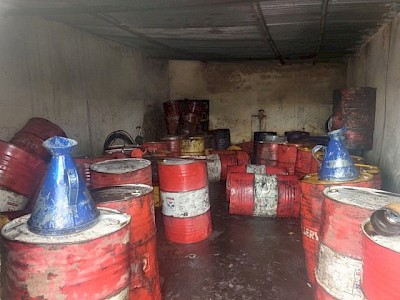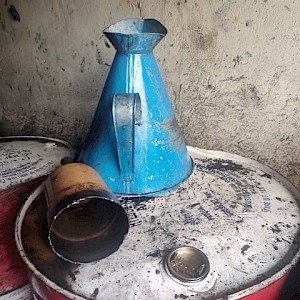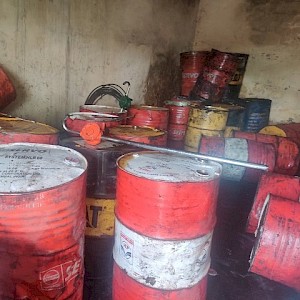Where is the Gap? Knowledge or Mindset
 There is a famous quote by Jim Rohn “Successful people do what unsuccessful people are not willing to do. Don't wish it were easier; wish you were better.". And this quote is not only for people but more applicable to the entire management team of any industry or company’s thought process.
There is a famous quote by Jim Rohn “Successful people do what unsuccessful people are not willing to do. Don't wish it were easier; wish you were better.". And this quote is not only for people but more applicable to the entire management team of any industry or company’s thought process.
Some companies talk about industrial 4.0, Reliability centred maintenance, Realtime information, and many advanced technologies to improve equipment reliability through lubrication maintenance. Whereas there are also companies that treat lubrication as the least important segment, and they still follow substandard/ historical lubrication practices just to “fill and forget” the machines.
In this article, I would like to share my personal experience on a later one.
I was in my hometown a couple of months ago, where I got an opportunity to visit a nearby open cast mining site. Though I grew up in a mining town but had never seen a mine through the eyes of a lubrication specialist.
Let me just give a brief of this visit (Lubrication Audit). The main objective of the lubrication audit was to find the gaps between current vs standard practices which gives a holistic picture of lubrication management, the organization’s awareness of contamination, and a proactive approach to controlling it. The audit includes some of the undermentioned points:
- What quality checks are undertaken at the time of reception of oil?
- Storage of oil – outdoor or indoor and with the right practices.
- Methods or tools for lubrication handling i.e. top-up containers, grease guns, etc.
- How are lubricants identified?
- Condition of Lube room to prevent contamination.
- Machine modification for easy visual inspection.
- Sampling methods & data recording process.
- Lube room management
- Oil renewal (contamination removal) of lube oil.
- Contamination exclusion strategies.
- Environmental disposal of used oil.
- Oil condition monitoring.
- Lubricant validation & consolidation
- And many more…
 With this audit & recommendation, one can identify the areas for improvement or continue the right practices with a more strategic approach
With this audit & recommendation, one can identify the areas for improvement or continue the right practices with a more strategic approach
Now coming to my audit, I started with the area which is treated as the “Kitchen of Lubrication Management”. What do you see in image 1- a lube room or lube disposal room?
It’s only a closed room which is named Oil Storage and serves both the purpose. Different grades of in-service oil like Hydraulic, Gear oil, Coolant, Transmission oil, Engine oil, Grease, etc. were present there. Also, a few old and damaged barrels were kept in a corner of the room for disposal, spilling dirty oil on the floor.
The condition of the oil storeroom was extremely bad and hazardous. A small spark could lead to a major fire accident. Lack of awareness was clearly visible like oil-soaked floor, poor ventilation, dust & dirt on barrels, a leaking roof allowing rainwater seepage, a single barrel pump for all lubricants, galvanized and substandard top-up containers, Uncovered Grease barrels, No fire safety equipment, and many more. Let us have look at images 2 & 3:
I spoke to a senior official of that mining company and shared my concern about the situation at their site and how the poor lubrication management can impact their machinery health, the equipment uptime, the environment and several other aspects. Based on my observation, I briefly suggested a few basic points as listed below:
- Firstly, to make a dedicated lube room where only fresh oil & accessories should be stored.
- Discard empty, used, and damaged barrels from the room.
- Introduction of LIS (Lubrication Identification System)
- Repair & painting of walls & roof.
- Dedicated barrel pump for different oil types.
- Dedicated & standard oil top-up containers
- The practice of colour-coding the accessories
- Arrangement of fire extinguishers & alarms, etc.
- Usage of filter carts
- Provision of ventilation system & adequate lights, etc.
- Proper housekeeping
 In no uncertain words, I told them "You don’t need to make a World Class Lube room but at least give a class to your Lubes”.
In no uncertain words, I told them "You don’t need to make a World Class Lube room but at least give a class to your Lubes”.
After an hour of discussion, the response I got from the official was disappointing. He said “Why would I do so much when I know that I will be transferred out by next year? And my senior will retire in the next couple of years. Nobody is going to take care of this after we leave. Then why do so much work and additional investment? We have also not faced any major problems with contamination. The dust particle usually gets settled at the bottom of the drum and we discard the barrel by that time oil reaches the bottom, so basically, we use only clean oil from the top. We keep the oil storage room locked mostly so chances are also low for dust & dirt. We do a time-based change of oil in machines. We do conduct some basic oil analysis but that is mostly for keeping audit objections away. Te dust in open cast mines is so high that no amount of filtration can help.” And many other excuses because he felt that focusing on lubrication was a waste of time and money.
Though in his heart he was convinced that my suggestions would result in a huge benefit for the mining company, still, the inertia of bringing about the change was compelling him to deny the benefits of the change.
This is when the heading of the article comes to my mind - "Where is the Gap? Knowledge or mindset… I was trying to share as much knowledge as I could, but the other person was reluctant to believe anything because of the mindset that the mine has been running for the last many years and nothing major has happened due to lubrication. Contamination is no big deal for them. This is not the thought of any individual, but the entire organisation. Perhaps the sad fact of many industries which are not assertive to adopt any change in their historical wrong practices. And again, a question arises “Why so?” It is likely due to a lack of rewards system or appreciation for the new initiative, Unsupportiveness for any investment from the company, a fear of “what if something went wrong”…
I am ending this article with a question for you all the readers: "How can we bridge the GAP?" and encourage a revolution of Achieving Reliability through Lubrication.
